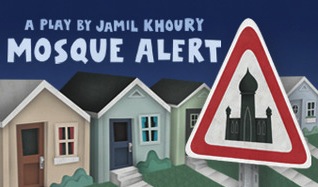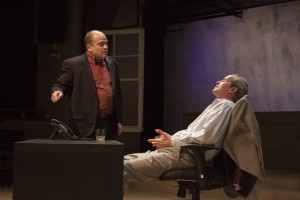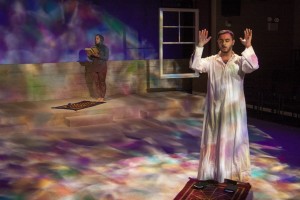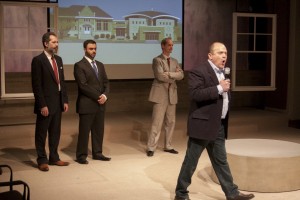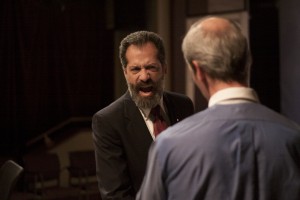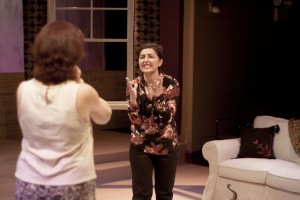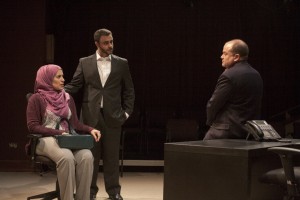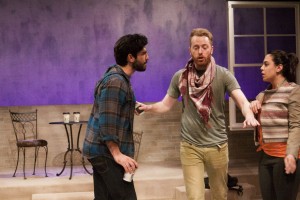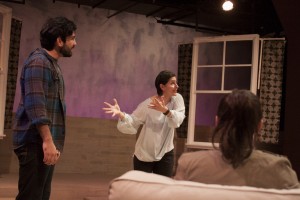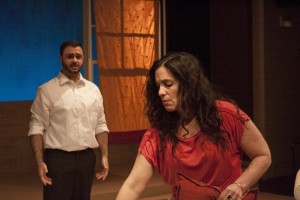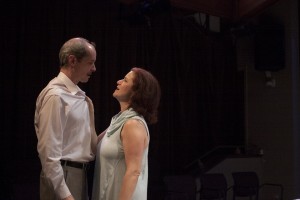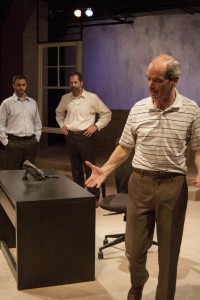NOT IN MY DOWNTOWN
Mosque Alert, an explosive world premiere, is seen’”and felt’”from all sides. Jamil Khoury’s culture-clashing creation depicts a suburban showdown, a battle over whether to replace a beloved old library with a state-of-the-art (Islamic) community center and mosque. The locale for Silk Road Rising’s invaluable offering is the huge village of Naperville, Illinois. For tax purposes as much as “progress,” the sprawling Chicago exurb needs to repurpose the abandoned but fondly remembered Old Nichols Library. The proposed replacement for this cherished downtown property? No less than the Al Andalus cultural complex (its name alluding to southern Spain’s golden age of tolerance and art during the Moorish monarchy). What could possibly go wrong?
Over the next 140 minutes, practically everything implodes. Two generations running through three families’”established Arab immigrants from Egypt and Syria and a “native” Caucasian clan’”are torn apart by an internecine squabble between uncompromising factions. (Khoury’s “custody battle” over the landmark mirrors the controversy over the proposed Cordoba House, the Ground Zero “victory mosque”’”as its opponents condemned it’”to be built a few blocks from the site of the 9/11 tragedy.) The tectonic result of irresistible force versus immovable object is a dramatized debate. It peaks in a tempestuous town-hall meeting and its ugly aftermath.
By play’s end we’re bombarded with facts and fears, arguments masking aggression, hate speech, scare tactics, threats and blackmail. Add to these conflicts of interest, libelous generalizations, and legitimate concerns succumbing to racist accusation–and you get a microcosm of America 2016. Eleven well-meaning characters find themselves caught on a crossroads, if not crossfire. They’re trapped between irreconcilable values: freedom of choice (or settlement censorship) against religious liberty (or the right to discriminate).
Though the character conflicts can seem overthought and predetermined, the domestic divisions strike home, as one mother and son support the mosque and a father and daughter reject it. Among the traditional citizens, Ted Baker (Mark Ulrich) is the chamber of commerce honcho whose real worship is money. His marketing-minded, quietly tippling wife Emily (Rengin Atay) struggles with a penchant for racial profiling even as she aims to launch a hijab-centered fashion line with Syrian refugee Aminah Qabbani (Rula Gardenier), ever dreaming of Damascus but assimilating to America.
The Baker children are similarly conflicted: Gay guy Carl (Riley McIlveen) wants to prove his multi-cultural credentials but detests the homophobia embodied by the mosque’s imam Mostafa Khalil (Frank Sawa). (Not all minorities are created equal’”in martyrdom or merit.) His sister Jennifer (Nina Ganet) is a Francophile, newly returned from Paris and skeptical of the machismo of her supposedly moderate, weed-toking Arab boyfriend Farid Qabbani (Andrew L. Saenz). A developer who refuses to sell out his people, Tawfiq Qabbani (Rom Barkhodar) represents business with a conscience.
A jihadist in embryo, the imam’s reactionary wife Aisha (Amy J. Carle) wants to stick it to her enemies, secular infidels bent on a new Crusade, by founding a fundamentalist/radical breakaway mosque. Her ideological opposite is Ted’s demagogic brother Daniel (Steve Silver), perpetrator of the panic-peddling “Mosque Alert” website: A polemical pitbull, this Islamophobe prates of “Moslem terror babies” and vilifies Al Andalus as a recruitment center for ISIS terrorism, misogyny, anti-Semitism, and Sharia law. Of course, his niece and nephew denounce their bachelor uncle’s rabble-rousing call to arms at the climactic town forum.
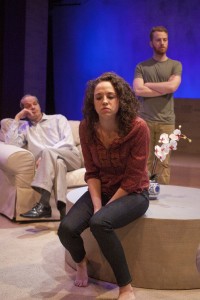 Similarly defined by the “position papers” they utter, the other characters are variously convincing mouthpieces, viewing themselves as paradoxical “extremists for equality” or potential cogs in a civil war. Will the disputed site yet become a house of worship through court action or a gourmet marketplace through venal deal-making? The unresolved outcome hints, bravely or not, that a non-Naperville audience must finish the play.
Similarly defined by the “position papers” they utter, the other characters are variously convincing mouthpieces, viewing themselves as paradoxical “extremists for equality” or potential cogs in a civil war. Will the disputed site yet become a house of worship through court action or a gourmet marketplace through venal deal-making? The unresolved outcome hints, bravely or not, that a non-Naperville audience must finish the play.
Despite Khoury’s kickass script, the opening-afternoon performance sounded astonishingly uncertain, marred by hesitant delivery and botched lines as if from recent rewrites, distractions from the many scene and prop changes, or simple underrehearsing. Soon enough, no doubt, Edward Torres’s staging will match the dialogue’s tensile immediacy but not, it seems, now. Presented, ironically or not, in a Protestant chapel, Khouri’s vital play remains exemplary in its civic-minded bridge-building.
Mosque Alert
Silk Road Rising
Pierce Hall
The Historic Chicago Temple Building
77 W. Washington St. Lower Level
Thurs at 7:30; Fri and Sat at 8; Sun at 4
ends on May 1, 2016
EXTENDED to May 15, 2016
for tickets, call 312.857.1234 x 201
or visit Mosque Alert
for info on more shows, visit Theatre in Chicago
